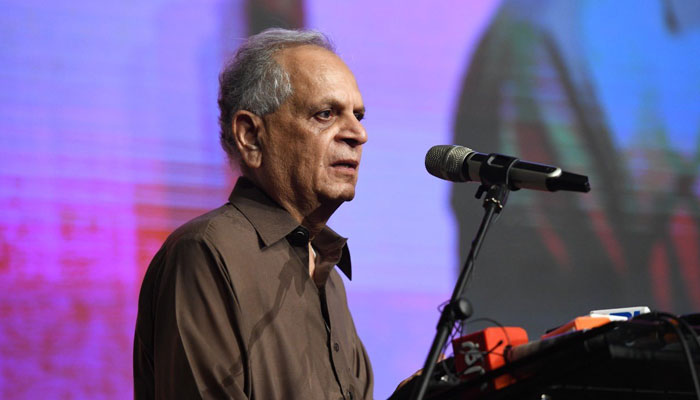‘Private sector must be allowed to import cheap LNG’
Iqbal Ahmed highlighted the bitter fact that since 2017, not a single new investment had taken place in the LNG sector in the country
ISLAMABAD: Pakistan GasPort Limited (PGPCL) Chairman Iqbal Z. Ahmed suggested on Thursday that the private sector should be allowed to import cheap liquefied natural gas (LNG) to fulfil consumers’ need.
Addressing a seminar titled ‘Unlocking the potential, navigating the future of LNG in Pakistan’, he said Ogra Chairman Masroor Khan should exercise his authority to open up LNG import sector for private players to bring more competition so that Pakistan could secure more investment in the sector.
Iqbal Ahmed highlighted the bitter fact that since 2017, not a single new investment had taken place in the LNG sector in the country. “GasPort terminal represents a combined investment of $500 million, and is the only terminal currently that has the capacity for LNG processing beyond the contracted capacities that the Government of Pakistan has at the two terminals, GasPort (PGPC) and Engro’s EEVT.
He pointed to how the two LNG private-sector operators, that have contributed significantly to saving precious foreign exchange by providing a relatively cheap fuel in relation to furnace oil, have had to go through harassment and intimidation, and in the case of EEVL, at the hands of NAB.
In October 2019, PLL, a government of Pakistan entity under the Ministry of Energy, rescinded its 15-year contract with GasPort (PGPC). Subsequently, after three years in arbitration at the London Court of International Arbitration, the decision of PLL was reversed and the contract reinstated.
He mentioned a total of 290 vessels have been unloaded at the GasPort, located in Port Qasim, since 2018 having in the process delivered 924 billion BTU of regasified natural gas to the national gas pipeline.
The Ogra chairman welcomed all guests, particularly those from the industry. He assured attendees of Ogra’s robust regulatory framework designed to support the LNG industry while respecting individual rights and protecting consumers.
Member Oil Zainul-Abideen Qureshi, in his opening address, underscored the vast opportunities for new LNG project developers and highlighted the critical role of existing terminal operators in enhancing Pakistan’s energy infrastructure. He reaffirmed Ogra’s commitment to fostering a supportive regulatory environment to attract investment and drive innovation in the LNG sector.
Presentations during the seminar, organised by Ogra, covered a wide range of crucial topics. These included development of new floating storage regasification units (FSRUs), expansion plans for existing terminals, and the strategic importance of LNG in ensuring Pakistan’s energy security and economic growth. Speakers delved into policy frameworks, regulatory incentives, and technological advancements essential for strengthening LNG infrastructure.
The discussions highlighted the importance of public-private partnerships in achieving the ambitious goals set for Pakistan’s LNG sector.
The event concluded with a collective commitment from all stakeholders to work towards a sustainable and prosperous future for LNG in Pakistan. Ogra reaffirmed its dedication to supporting the industry’s growth, ensuring a reliable and efficient energy supply for the nation.
-
 Prince William, Kate Middleton Private Time At Posh French Location Laid Bare
Prince William, Kate Middleton Private Time At Posh French Location Laid Bare -
 Stefon Diggs Family Explained: How Many Children The Patriots Star Has And With Whom
Stefon Diggs Family Explained: How Many Children The Patriots Star Has And With Whom -
 Shamed Andrew ‘mental State’ Under Scrutiny Amid Difficult Time
Shamed Andrew ‘mental State’ Under Scrutiny Amid Difficult Time -
 ‘Narcissist’ Andrew Still Feels ‘invincible’ After Exile
‘Narcissist’ Andrew Still Feels ‘invincible’ After Exile -
 Bad Bunny's Super Bowl Halftime Show: What Time Will He Perform Tonight?
Bad Bunny's Super Bowl Halftime Show: What Time Will He Perform Tonight? -
 Where Is Super Bowl 2026 Taking Place? Everything To Know About The NFL Showdown
Where Is Super Bowl 2026 Taking Place? Everything To Know About The NFL Showdown -
 Chris Pratt Explains Why He And Katherine Schwarzenegger Did Premarital Counseling
Chris Pratt Explains Why He And Katherine Schwarzenegger Did Premarital Counseling -
 Drake 'turns Down' Chance To Hit Back At Kendrick Lamar At Super Bowl
Drake 'turns Down' Chance To Hit Back At Kendrick Lamar At Super Bowl -
 Sarah Ferguson Had A ‘psychosexual Network’ With Jeffrey Epstein
Sarah Ferguson Had A ‘psychosexual Network’ With Jeffrey Epstein -
 Miranda Kerr Shares The One Wellness Practice She Does With Her Kids
Miranda Kerr Shares The One Wellness Practice She Does With Her Kids -
 Czech Republic Supports Social Media Ban For Under-15
Czech Republic Supports Social Media Ban For Under-15 -
 Khloe Kardashian Shares How She And Her Sisters Handle Money Between Themselves
Khloe Kardashian Shares How She And Her Sisters Handle Money Between Themselves -
 Prince William Ready To End 'shielding' Of ‘disgraced’ Andrew Amid Epstein Scandal
Prince William Ready To End 'shielding' Of ‘disgraced’ Andrew Amid Epstein Scandal -
 Chris Hemsworth Hailed By Halle Berry For Sweet Gesture
Chris Hemsworth Hailed By Halle Berry For Sweet Gesture -
 Blac Chyna Reveals Her New Approach To Love, Healing After Recent Heartbreak
Blac Chyna Reveals Her New Approach To Love, Healing After Recent Heartbreak -
 Royal Family's Approach To Deal With Andrew Finally Revealed
Royal Family's Approach To Deal With Andrew Finally Revealed




